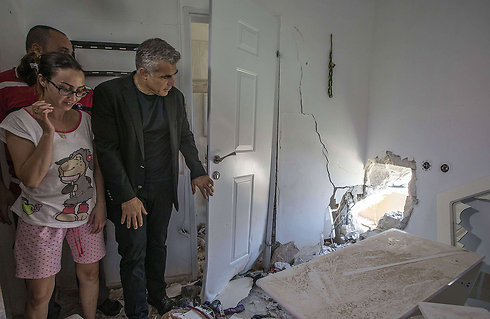Government to convene in Hof Ashkelon to discuss budget cuts
Gaza-border communities to receive 1.3 billion shekels for rehabilitation over five years; government ministries face 2 percent cuts to fund Protective Edge.
The weekly cabinet meeting on Sunday will take place in the Hof Ashkelon Regional Council in southern Israel. The convened ministers will decide on any change of priorities in the 2014 budget, in order to fund the costs of Operation Protective Edge.
According to the decision, residents of Gaza-border communities living up to 7 kilometers from the Strip will receive a budget injection of 1.3 billion shekels over the next five years – including nearly NIS 200 million in the current fiscal year.
Communities in the Eshkol, Sha'ar HaNegev, Sdot Negev, and Hof Ashkelon regional councils will receive the additional aid. Many other cities and towns – also heavily hit by the rockets from Gaza – were not included, among them Ashkelon, Ashdod, Be'er Sheva, and Ofakim.
The decision over which communities were eligible for the budgetary allowances was taken by Finance Minister Yair Lapid and the Prime Minister's Office.
A government statement on the decision said "it is the intention of the government to strengthen the defensive resilience of Gaza-border residents with a variety of means, including protective installations and other measures."
Included in the budgetary injection are funds to properly equip the regional councils in order to improve their search & rescue, first aid, or fire-fighting capabilities. The government will also invest 16 million shekels in security-related forestation.
Southern Israeli authorities received dozens of millions in emergency assistance since the beginning of the latest round of hostilities.
Budgetary cuts to government ministries will increase to 1.9 billion shekels, with a systemic cut of 2 percent to every ministry.
The Education and Transportation Ministries face the heaviest cuts, with 480 million shekels being cut from the education budget and another 175 million cut from higher education for 2014. The Transportation Ministry will face a deep slash of 243 million shekels from its development plans for the current year.
The Health Ministry will lose 43 million shekels from its 2014 allocation and the Welfare Ministry will be forced to part with 62 million shekels.
The Finance Ministry claimed they will attempt to cut underperforming programs – but such steep cuts mean the effect will be significant.
The majority of the sum, some 1.5 billion shekels, will be used to cover part of the expense of the IDF operation. About 200 million shekels will be used to cover the costs of the financial and civil assistance to southern Israel's residents, as part of the aforementioned five year plan – set to be authorized by the government next week.
The wide cuts will apply to the basic government budget, the one which the Finance Ministry passes from year to year, and if the cuts are passed on Sunday, the decision will continue to apply in future years.
The systemic cut will not apply to the salaries of government employees or to the defense budget.
Finance Minister Yair Lapid claimed that "education, health, and welfare will have more money next year than they had in the 2014 budget. But still, we need to fund the war. We will quash the reserves to fund it. We are providing a large benefit package for the south, and we are not raising taxes. Lapid reiterated his commitment to not increase taxes to Ynet.
The administration has planned to define Protective Edge as an "emergency situation" to allow the government to use funds accrued by the Administrator General and Official Receiver and have yet to be claimed. The law allows the government to use funds deposited to education, health, welfare, environment, and trade.
The administration is expected to authorize the use of those funds to pay for the costs of the operation.
Avital Lahav contributed to this report.











